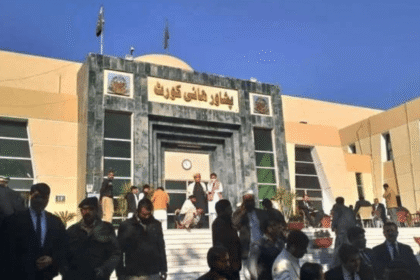In a significant move aimed at enhancing student safety and improving the quality of education in Punjab, Chief Minister Maryam Nawaz has mandated the immediate closure of schools operating in unsafe and deteriorating buildings. This directive comes in response to growing concerns about the safety of educational infrastructure across the province, emphasizing a proactive approach to safeguarding students and promoting a conducive learning environment.
The Need for Safety in School Infrastructure
The decision to seal unsafe school buildings reflects a broader recognition of the critical role that infrastructure plays in the educational experience. Unsafe structures can pose serious risks, not only in terms of physical safety but also in creating an environment that is not conducive to learning. Reports of deteriorating facilities, structural weaknesses, and inadequate maintenance have raised alarms among parents, educators, and authorities alike.
Maryam Nawaz’s directive underscores the government’s commitment to prioritizing student welfare. By taking immediate action to inspect and seal these buildings, the Punjab government aims to prevent potential tragedies and ensure that children have access to safe educational environments.
Key Initiatives
- Immediate Inspections and Closures:
The Chief Minister has ordered authorities to conduct thorough inspections of all school buildings across Punjab. Those found to be structurally compromised will be sealed immediately. This initiative not only addresses current safety concerns but also sets a precedent for regular assessments of school infrastructure moving forward. - Focus on Cleanliness Standards:
In addition to structural safety, the Chief Minister has emphasized the importance of maintaining cleanliness in schools. Poor sanitation can hinder the learning process and adversely affect student health. By raising cleanliness standards, the government aims to enhance the overall quality of public education facilities, fostering a healthier environment for students. - Addressing Encroachments:
During her address at the Deputy Commissioner’s office in Muzaffargarh, Maryam Nawaz highlighted the issue of encroachments in central areas, which can further complicate access to safe educational facilities. She urged immediate action to remove these encroachments, thereby improving the overall landscape of public spaces. - Revival of Non-Functional Schools:
Earlier initiatives in June saw the revival of 603 non-functional schools across Punjab as part of the Public Schools Reorganisation Programme. This effort aims to maximize the use of existing infrastructure and provide education to more children, particularly in underserved areas. - Green School Programme:
The Chief Minister has launched a Green School Programme that encourages environmental stewardship among students. Each student will plant at least one sapling, fostering a sense of responsibility towards the environment and promoting sustainability within the educational framework. - Regularization of Education Staff:
To enhance the quality of education, Maryam Nawaz has called for the regularization of 14,000 assistant education officers (AEOs) and secondary school educators (SSEs) in Punjab. This move aims to ensure that qualified personnel are consistently available to support educational initiatives. - Introduction of New Curriculum Elements:
Proposals to introduce spoken English and character-building classes in government schools have been put forward. These initiatives aim to equip students with essential life skills and enhance their language proficiency, preparing them for a competitive future. - Competitions to Foster Engagement:
The Chief Minister has encouraged the organization of weekly and monthly competitions in various fields to promote student engagement and development. Such activities can play a crucial role in building confidence, teamwork, and creativity among students. - Playground Development:
Recognizing the importance of recreational facilities, the Chief Minister announced plans to construct and rehabilitate 1,000 playgrounds within six months. Access to play areas is vital for the physical and mental well-being of students, allowing them to engage in healthy activities outside the classroom. - Punjab School Nutrition Programme:
As part of efforts to improve students’ health and learning outcomes, the Punjab School Nutrition Programme will be piloted in Rajanpur, Layyah, and Bhakkar. This initiative aims to ensure that children receive adequate nutrition, directly impacting their academic performance and overall well-being.
Challenges Ahead
While these initiatives mark a significant step forward, challenges remain. The implementation of such extensive programs requires adequate funding, resources, and coordination among various government departments. Ensuring that all schools, especially in rural and underserved areas, meet safety standards will be crucial.
Additionally, there may be resistance from certain stakeholders who might view the closure of schools as a disruption to education. It will be essential for the government to communicate the reasons behind these decisions effectively, emphasizing the long-term benefits of ensuring safety and quality in education.
Community Involvement
The success of these initiatives will largely depend on community involvement. Parents, teachers, and local organizations must be engaged in the process to ensure that the measures taken are comprehensive and address the specific needs of their communities.
Involving stakeholders in the inspection process can help build trust and transparency, ensuring that safety assessments are thorough and accurate. Furthermore, community feedback can guide future initiatives, allowing for a more tailored approach to addressing educational challenges.
The directive by Chief Minister Maryam Nawaz to seal unsafe school buildings is a commendable step towards ensuring the safety and well-being of students in Punjab. By prioritizing infrastructure, cleanliness, and overall quality in education, the government aims to create an environment conducive to learning and personal development.
As these initiatives unfold, the focus must remain on sustainable implementation, ensuring that the improvements made today lay the foundation for a brighter future for the next generation. The commitment to student safety, health, and engagement reflects a holistic approach to education, setting a positive precedent for governance in the region.
Moving forward, it is imperative for the government to maintain momentum, continually assessing and addressing the evolving needs of the education sector. With the support of communities, educators, and policymakers, Punjab can pave the way for a safer, more inclusive, and more effective educational landscape.







